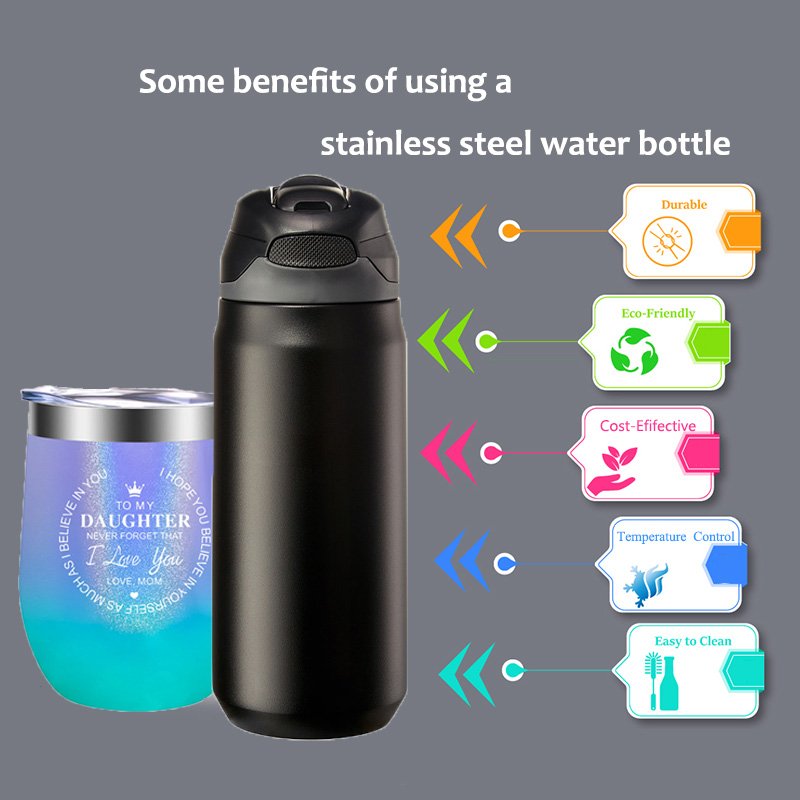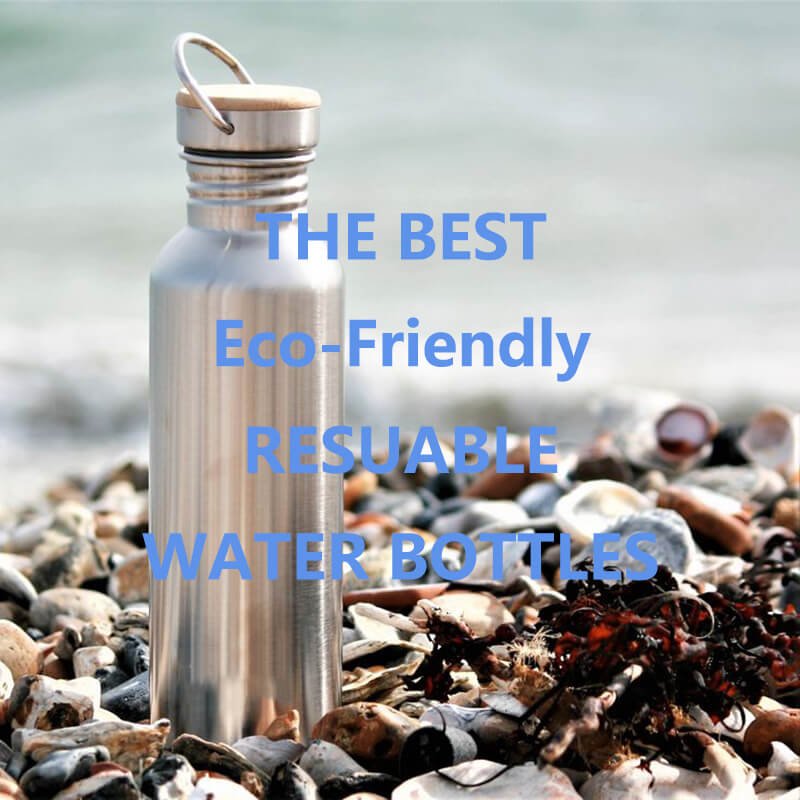Choosing the right water bottle is not just about convenience and style, but also about health. With so many options available in the market, it can be overwhelming to decide which material is the healthiest for a water bottle. In this blog post, we will explore the different materials used for water bottles and determine the healthiest option.
Stainless Steel Water Bottles
Stainless steel water bottles have gained popularity for their durability and ability to keep beverages at the desired temperature. They are also known for being free from harmful chemicals such as BPA, phthalates, and lead. Stainless steel is non-reactive, which means it won’t leach harmful substances into your drink, making it a safe choice for health-conscious individuals.
Additionally, stainless steel water bottles are easy to clean and maintain. They are resistant to rust and corrosion, making them suitable for long-term use. With proper care, a high-quality stainless steel water bottle can last for years, reducing the need for single-use plastic bottles.
Glass Water Bottles
Glass water bottles are another healthy option for carrying beverages. They are non-porous and do not retain odors, making them ideal for storing various drinks without the risk of contamination. Unlike plastic bottles, glass bottles do not contain harmful chemicals that can leach into the liquid.
One of the key benefits of glass water bottles is that they are environmentally friendly and recyclable. Glass is made from natural materials, and it can be recycled indefinitely without losing its quality. This makes glass a sustainable choice for eco-conscious consumers who want to minimize their environmental impact.
BPA-Free Plastic Water Bottles
Many plastic water bottles are labeled as “BPA-free,” indicating that they do not contain bisphenol A, a chemical that has been linked to various health concerns. BPA-free plastic water bottles are lightweight and durable, making them a convenient choice for on-the-go hydration.
While BPA-free plastic bottles are considered safer than those containing BPA, it’s essential to note that they may still contain other potentially harmful chemicals. Some studies have raised concerns about the leaching of phthalates from plastic containers, which can have adverse effects on health.
Conclusion
When it comes to choosing the healthiest material for a water bottle, both stainless steel and glass are excellent options. Stainless steel is known for its durability and resistance to leaching, while glass is prized for its purity and recyclability. BPA-free plastic bottles can be a suitable choice for individuals who prefer a lightweight and affordable option, but it’s important to be mindful of potential chemical leaching.
Ultimately, the healthiest material for a water bottle depends on individual preferences and priorities. Whether it’s the purity of glass, the durability of stainless steel, or the convenience of BPA-free plastic, making an informed decision can lead to a healthier and more sustainable hydration habit.
Aluminum Water Bottles
Aluminum water bottles have also gained popularity as a healthy alternative to traditional plastic bottles. Aluminum is a lightweight, durable, and recyclable material that is commonly used for various beverage containers. Unlike some plastic bottles, aluminum is free from BPA and other potentially harmful chemicals.
One of the advantages of aluminum water bottles is their ability to keep drinks cold or hot for an extended period. The metallic material acts as an insulator, helping to maintain the desired temperature of the contents. Additionally, aluminum bottles are resistant to scratches and dents, making them a long-lasting choice for everyday use.
However, it’s essential to note that some concerns have been raised about the potential leaching of aluminum into the liquid contents. While the risk is generally considered low, individuals with certain health conditions, such as kidney disease, may want to consult with a healthcare professional before using aluminum water bottles regularly.
Silicone Water Bottles
Silicone water bottles have emerged as a unique option in the water bottle market. Made from a synthetic rubber material, silicone bottles are known for their flexibility, durability, and ease of cleaning. Unlike rigid plastic or metal bottles, silicone bottles can be easily folded or rolled up for convenient storage and transportation.
One of the key advantages of silicone water bottles is that they are free from BPA, phthalates, and other potentially harmful chemicals. Silicone is a inert material that does not react with the liquid contents, ensuring that no contaminants are leached into the water or beverage.
Additionally, silicone bottles are often designed with a wide mouth, making them easy to fill, clean, and add ice cubes or sliced fruits for infused water. They are also dishwasher-safe, further simplifying the cleaning process.
Ceramic Water Bottles
Ceramic water bottles offer a unique and sophisticated option for those seeking a healthier alternative to traditional plastic or metal bottles. Crafted from natural clay materials, ceramic bottles are non-toxic, lead-free, and do not contain any synthetic chemicals that could potentially leach into the liquid contents.
One of the distinctive features of ceramic water bottles is their ability to maintain the temperature of the liquid. The ceramic material acts as an insulator, keeping cold drinks chilled and hot beverages warm for an extended period. This feature can be particularly useful for individuals who enjoy sipping on their favorite hot tea or coffee throughout the day.
Ceramic water bottles are also known for their aesthetic appeal, with a wide range of designs and patterns available to suit various personal styles. Many ceramic bottles are hand-crafted, adding an artisanal touch to the overall drinking experience.
Comparing the Health Benefits
When it comes to choosing the healthiest material for a water bottle, there are several factors to consider. Each material has its own unique advantages and potential drawbacks, so it’s essential to weigh the pros and cons to make an informed decision.
Stainless steel water bottles are widely regarded as one of the healthiest options, as they are free from harmful chemicals and do not leach any substances into the liquid contents. Glass bottles also offer a safe and sustainable choice, as they are non-porous and do not retain odors or flavors.
BPA-free plastic bottles are a viable option, but it’s important to be mindful of the potential leaching of other chemicals, such as phthalates. Aluminum water bottles are another choice, but individuals with certain health conditions may want to consult with a healthcare professional before using them regularly.
Silicone and ceramic water bottles are also noteworthy options, as they are non-toxic and do not contain any harmful chemicals. These materials can provide added benefits, such as temperature maintenance and unique aesthetic appeal.
Factors to Consider When Choosing a Water Bottle
In addition to the material, there are several other factors to consider when selecting a water bottle that is both healthy and practical for your needs. These include:
Durability and Ease of Use
The water bottle you choose should be durable enough to withstand daily use without easily breaking or developing cracks. It should also be easy to open, close, and clean, ensuring a hassle-free drinking experience.
Leak-Proof Design
A well-designed, leak-proof water bottle is essential to prevent spills and leaks, especially when carrying it in a bag or during travel. Look for bottles with secure lids or caps that create a tight seal to keep the contents contained.
Capacity and Portability
Consider the size and capacity of the water bottle to ensure it meets your hydration needs. If you’re an active individual or frequently on the go, a larger capacity bottle may be more convenient. Portability is also an important factor, as you’ll want a bottle that is easy to carry and fits comfortably in your hand or bag.
Sustainability and Environmental Impact
For eco-conscious consumers, the sustainability and environmental impact of the water bottle material are crucial considerations. Opt for bottles that are made from recyclable or eco-friendly materials, and consider the overall lifecycle of the product.
Personal Preferences and Aesthetics
Lastly, personal preferences and the overall aesthetic appeal of the water bottle should not be overlooked. Choose a bottle that aligns with your style and personal taste, as this can enhance your overall drinking experience and make it more enjoyable to use on a daily basis.
Conclusion
Choosing the healthiest material for a water bottle is an important decision that can have a significant impact on your overall health and well-being. By considering factors such as chemical composition, durability, and sustainability, you can make an informed choice that aligns with your personal values and lifestyle.
Whether you opt for stainless steel, glass, BPA-free plastic, aluminum, silicone, or ceramic, the key is to select a water bottle that not only keeps your drinks fresh and flavorful but also provides peace of mind knowing that you are using a safe and sustainable product. By making a conscious choice, you can stay hydrated in a way that supports your health and the environment.




Dank der behördlichen Regulierung bietet die Plattform nun auch PayPal als Zahlungsoption an, was zusätzliche Sicherheit und Bequemlichkeit für die Spieler gewährleistet.
Bet-at-Home beeindruckt mit einer breiten Spielauswahl, darunter erstklassige Spielautomaten und Sportwetten. Gegründet 1999 in Österreich, erhielt das deutsche Online-Casino 2021 eine GGL-Lizenz.
Spieler schätzen das mobile Casino, da sie jetzt ihre Lieblings
Slots buchstäblich überall spielen können. Dies bedeutet, dass Sie sowohl um echtes Geld
als auch kostenlos mit Demoversionen von Spielen von einem Mobiltelefon aus spielen können. 2025 wollen immer mehr deutsche Gamer ihre Lieblingsspiele auch unterwegs genießen. Einerseits können Sie jederzeit und überall spielen, genau
wie jedes Online Casino-Spiel. Regelmäßig erscheinen neue deutsche Online Casinos auf dem deutschen Glücksspielmarkt.
Einige Online Casinos werben mit einem besonders hohen Durchschnitt der Ausschüttungsquoten bei Glücksspielen, um
Aufmerksamkeit zu erregen.
Viele Casinos bieten zudem kostenlose Versionen ihrer Spiele an, um den Einstieg
zu erleichtern. Besonders Slots bieten eine breite Palette an Erfahrungen – von einfachen Spielen mit niedrigen Einsätzen bis hin zu komplexen Games,
die hohe Gewinne versprechen. Bevor du dich für ein Online Casino entscheidest,
empfehlen wir, die Spieleauswahl der verschiedenen Anbieter genau zu vergleichen.
Spiele mit einem hohen RTP bieten dir theoretisch bessere Gewinnchancen. Mit hunderten von Themen, von altägyptischen Abenteuern über fruchtige Klassiker bis hin zu modernen,
filmreifen Inszenierungen, bieten Slots für jeden Geschmack etwas.
Trotz dieser Einschränkungen ist die Welt der Automatenspiele, auch bekannt
als Slots, vielfältiger und spannender denn je.
References:
https://online-spielhallen.de/wunderino-casino-login-ihr-tor-zu-spannenden-spielen/
Digital currency transactions process within minutes and offer additional anonymity for your gaming activities.
Cryptocurrency deposits are available through Bitcoin, Ethereum,
and Litecoin. They maintain game integrity while creating enjoyable social atmospheres.
After logging out, go back to the brand’s website in an incognito window
to make sure the account dashboard doesn’t load automatically.
Always keep personal details current, and report suspicious activity directly
to the brand’s support centre. Prompt password management is critical for casino
security. Access National Casino on your phone for seamless gaming and fast payouts.
Cards, e-wallets, and banking methods that
are popular with Australian customers work perfectly on mobile devices.
Use biometric authentication when you can to speed up
sign-ins and make your account safer.
While most options are fee-free, some bank transfers may come with an intermediary fee (up to
25 AUD), and closing your account manually after cashing out may result in a one-time 20 AUD charge.
National Casino supports a broad variety of payment methods that suit the preferences of Australian players
— whether you favour classic bank cards, digital wallets, or even cryptocurrency.
The mobile version includes all the same
pokies and table games, with excellent graphics and responsive performance even on smaller screens.
The prize is revealed only after the deposit and may
include bonus funds, free spins, or other surprises.
References:
https://blackcoin.co/tattersalls-hotel-casino/
It’s got a truly unique website design, offers a great welcome bonus and
no deposit bonuses, provides excellent user experience overall, and is very much deserving of
the #1 spot on my list. Although online casino games can be a lot of fun, they are most certainly
not worth risking ruining your life. When dealing with Curacao casinos, we recommend that you always read our expert online casino reviews as carefully as possible.
This means that Australian online casino enthusiasts do not have local authorities whose words they can listen to to determine
which casinos are safe.
The best Australian online casinos are characterized by their vast game
selections, attractive bonuses, and secure payment methods.
Opt for the best online casinos offering a diverse range of games to keep things interesting.
Many Australian online casinos offer a variety of high RTP games,
making them attractive due to better winning
chances. For 2025, players should focus on casinos highlighting bonuses,
diverse games, and high payout rates. The leading Australian online casinos
distinguish themselves with extensive game selections,
appealing bonuses, and dependable payment methods. At online casinos in Australia, you can try your luck at slots and poker
games, which offer the opportunity to win a progressive jackpot.
paypal casinos for usa players
References:
https://finbullish.com/companies/mejores-casinos-online-con-dinero-real-en-usa-top-2025
paypal casinos online that accept
References:
aviempnet.com